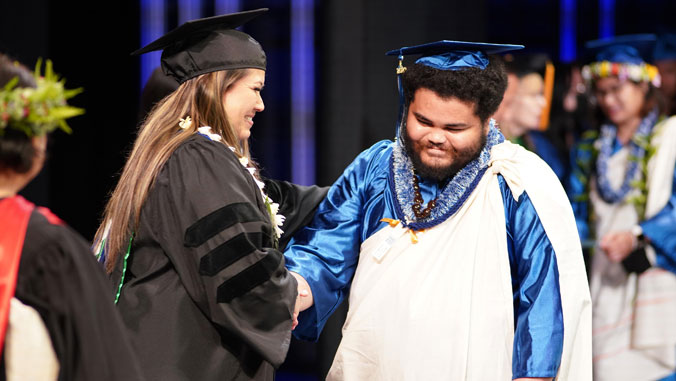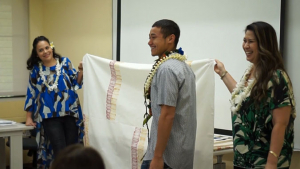
Kapiʻolani Community College is one of 12 community colleges nationwide selected to receive a $75,000 grant and participate among a cohort of colleges in the University of Southern California Race and Equity Center’s Takeoff: Institutional Innovations for College Men of Color project. The grant assists community colleges nationwide that are advancing initiatives to support men of color on their campuses.
“We are very excited to be awarded this grant as a way to support our Native Hawaiian and Pacific Island males at Kapiʻolani,” said Interim Vice Chancellor for Student Affairs Michaelyn Nākoa Hall. “We have always known there was a disparity in enrollment between Native Hawaiian males and females. When this proposal was posted, we took a look at the data and were shocked at how big the gap was. Of the Native Hawaiian students at Kapiʻolani CC, only one-third were males compared to the two-thirds female. This motivated our team to devise a plan to support our kāne.”
Kapiʻolani’s Takeoff pilot will diversify the Indigenous populations served through the ECMC Foundation’s Men of Color Initiative by developing scalable, culturally responsive interventions for Pacific Island men, including Native Hawaiians. The ECMC Foundation has made a $20-million commitment to transform the higher education experiences for Black, Latinx, Southeast Asian and Native American men. The Men of Color Initiative specifically aims to increase those earning degrees.
Opportunities for personal growth

Culturally rooted strategies and approaches are the foundation for the pilot program, presenting opportunities for personal growth and creating space to experience the richness of and connection to ʻāina (land), family and community, while focusing on the development of identity development and intersecting dimensions, including kū (masculine energy), hina (feminine energy), ethnic, cultural, religious, spiritual and māhū (those who embody both male and female spirit) for Native Hawaiian and Pacific Islander men.
A six-member team composed of campus administrators and program directors primarily responsible for Kapiʻolani CC’s student support services for Native Hawaiian and Pacific Islander students will initiate the pilot program.
“As we support students on campus, we must make intentional space for peer connections between students as the driving force of supporting students,” said Shannon Sakaue, a counselor for returning adults. “The peer network they weave together during their time on our campuses is the very leverage they will often seek first when difficulties arise. In essence, they become their own network of advocacy and strength, and their success is reinforced by the programs and resources on our campuses. This pilot will provide intentional opportunities for students to connect with their peers in meaningful ways, and see their own cultural values embedded throughout their experience.”

